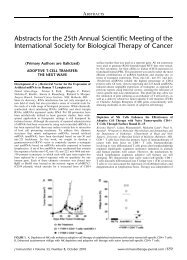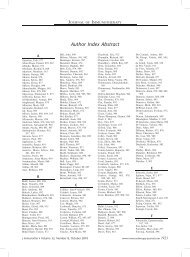FINAL PROGRAM - Society for Immunotherapy of Cancer
FINAL PROGRAM - Society for Immunotherapy of Cancer
FINAL PROGRAM - Society for Immunotherapy of Cancer
Create successful ePaper yourself
Turn your PDF publications into a flip-book with our unique Google optimized e-Paper software.
Plenary and Concurrent Sessions<br />
The following provides the context <strong>for</strong> the plenary and concurrent<br />
sessions.<br />
BIOLOGY AND APPLICATION OF DENDRITIC CELLS<br />
Plenary Session<br />
Friday, November 4<br />
8:45 am – 11:30 am<br />
Grand Ballroom Salon E<br />
Dendritic cells (DCs) play a central role in the immune<br />
response to tumors and <strong>for</strong> many immunotherapeutic strategies,<br />
understanding their complex biology continues to be <strong>of</strong> critical<br />
importance. Recent advances in knowledge about DC subsets<br />
and functions, as well as clinical trials <strong>of</strong> DC based vaccines will be<br />
discussed.<br />
IMMUNOLOGY OF CANCER STEM CELLS AND<br />
EPITHELIAL-TO-MESENCHYMAL TRANSITION (EMT)<br />
Concurrent Session<br />
Friday, November 4<br />
1:30 pm – 3:00 pm<br />
Grand Ballroom Salon E<br />
Recent data suggests that a minor subpopulation <strong>of</strong> tumor stem<br />
cells are involved in tumor initiation, and that the process <strong>of</strong> EMT<br />
drives a more metastatic and drug resistant population. Current<br />
treatment modalities target non-stem cells, thus tumor-initiating<br />
stem cells and/or cells that have undergone EMT may persist and<br />
repopulate/recreate the tumor. Clinicians and investigators need to<br />
be educated on the most recent understanding <strong>of</strong> the role <strong>of</strong> EMT<br />
and/or cancer stem cell subpopulations, and their differences in<br />
signaling, immune interaction and susceptibility to targeted killing by<br />
various immunotherapeutic strategies.<br />
UNCOUPLING NEGATIVE REGULATION IN THE<br />
TUMOR MICROENVIRONMENT<br />
Concurrent Session<br />
Friday, November 4<br />
1:30 pm – 3:00 pm<br />
Grand Ballroom Salon G-H<br />
Recent studies have shown that a major barrier to effective<br />
T cell-mediated tumor destruction involves negative regulatory<br />
pathways in the tumor microenvironment. The identification <strong>of</strong><br />
these pathways has pointed towards new targets <strong>for</strong> immune<br />
potentiation. Blocking specific negative regulatory pathways has<br />
been effective in numerous preclinical studies, and is already leading<br />
to promising results in early phase clinical trials. Our current<br />
understanding <strong>of</strong> these inhibitory pathways, such as Tregs, MDSCs,<br />
CTLA-4, PD-1, and IDO will be discussed.<br />
GENETICALLY ENGINEERED RECEPTORS AND<br />
ADOPTIVE CELL THERAPIES<br />
Plenary Session<br />
Friday, November 4<br />
3:15 pm – 5:15 pm<br />
Grand Ballroom Salon E<br />
Adoptive T cell therapy is an evolving immunotherapeutic<br />
approach with promising clinical activity. Engineering T cells to<br />
express specific T cell receptors or chimeric receptors is allowing<br />
retargeting <strong>of</strong> specificity <strong>of</strong> adoptively transferred cells. By<br />
advancing techniques and understanding <strong>of</strong> the most recent clinical<br />
applications <strong>of</strong> autologous lymphocytes with engineered receptors,<br />
these promising cancer treatment approaches may be made<br />
applicable to a greater number <strong>of</strong> cancer patients with improved<br />
specificity and efficacy. Sharing in<strong>for</strong>mation from the most recent<br />
scientific approaches and clinical trials will help researchers refine<br />
these novel cellular therapies.<br />
CHARACTERIZATION OF INFLAMMATORY<br />
INFILTRATES IN HUMAN CANCERS<br />
Plenary Session<br />
Saturday, November 5<br />
8:45 am – 11:30 am<br />
Grand Ballroom Salon E<br />
While melanoma has traditionally been focused upon <strong>for</strong> many<br />
studies <strong>of</strong> anti-tumor immunity and cancer immunotherapy,<br />
recent work has indicated that lymphocytic infiltrates with specific<br />
phenotypes can be observed in a wider range <strong>of</strong> cancers, and<br />
that this in<strong>for</strong>mation can have prognostic importance. These<br />
observations suggest that therapies aimed at immune modulation<br />
could have broader application beyond melanoma, and also<br />
motivate the consideration <strong>of</strong> predictive biomarkers <strong>for</strong> clinical<br />
response to such interventions.<br />
STATE OF THE ART ANIMAL MODELS AND<br />
VETERINARY APPLICATIONS FOR CANCER AND<br />
IMMUNOLOGY<br />
Concurrent Session<br />
Saturday, November 5<br />
1:30 pm – 3:00 pm<br />
Grand Ballroom Salon E<br />
Many transplantable tumor models in animals are not accurately<br />
representative <strong>of</strong> the complexities <strong>of</strong> human cancer, there<strong>for</strong>e,<br />
more sophisticated animal models are being developed with the<br />
hope <strong>of</strong> having better predictive value <strong>for</strong> ultimate clinical benefit<br />
in humans. These include genetically engineered mouse models<br />
using defined permutations <strong>of</strong> oncogenes, as well as large mammal<br />
models in outbred veterinary populations.<br />
26 TH ANNUAL<br />
MEETING DETAILS<br />
<strong>FINAL</strong> <strong>PROGRAM</strong> • SITC 26 TH ANNUAL MEETING<br />
November 4-6, 2011 • North Bethesda, MD • www.sitcancer.org<br />
15









